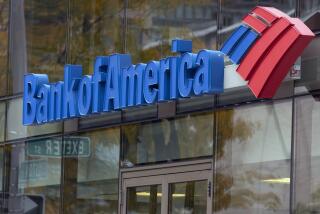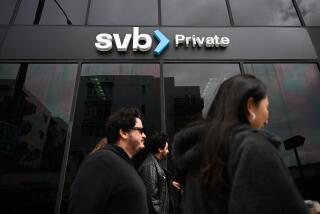Confusion at IndyMac fuels customers’ anger
Depositors of failed IndyMac Bank endured long waits in the summer heat for a second day Tuesday, with crowds becoming irate at several branches and customers with large accounts complaining of serious problems in getting their money.
Banking experts said the chaotic scenes risked touching off runs on other banks unless federal regulators quickly cashed out insured accounts and gave depositors accurate information about their funds.
The Federal Deposit Insurance Corp. took over Pasadena-based IndyMac late Friday and has assured depositors that accounts with $100,000 held in a single name or $250,000 in a retirement account are safe.
But many customers have said that when they checked their balances online, tens of thousands of dollars appeared to be missing. And when they went to branches in search of answers, they encountered lines hundreds of people deep and unhelpful staff members. On Tuesday, reports of unruly crowds brought police to branches in Encino and Northridge, although there were no arrests or injuries.
Noelle Gabay of Northridge, a budget analyst for the state of California, said FDIC officials acknowledged that she was owed $213,500 but provided her access only to $99,000.
“My trust in the FDIC is gone,” said Gabay, 49. “The question is now, where do we put our money? Do we buy a bigger mattress?”
Bert Ely, a banking consultant in Arlington, Va., whose clients include financial-services trade groups, said the IndyMac situation was “generating anxieties all across the country.”
“They should have been better prepared for this,” he said, adding that regulatory oversight of IndyMac had been lax.
Ely noted that the bank, hobbled by massive defaults on loans made at the height of the real estate market, was not on the FDIC’s list of troubled institutions as of March 31. It was placed on the list in June. However, he said IndyMac’s fall was hastened by public questions from Sen. Charles E. Schumer (D-N.Y.) last month about the bank’s strength -- comments that apparently helped trigger a $1.3-billion run on deposits.
Schumer has responded to such criticism by saying that IndyMac brought on its own problems by engaging for years in “poor and loose lending practices” that regulators should have prevented.
Longtime bank analyst Frederick Cannon, chief equity strategist for Keefe, Bruyette & Woods, said because of the distress at IndyMac, executives at other banks “are working very actively with their depositors to explain how insurance works, and what’s covered.”
John Bovenzi, the FDIC official who is now IndyMac’s chief executive, acknowledged that some online records of accounts and insurance were inaccurate, fueling fear and anger among depositors. “They’ll need to talk to an FDIC claims manager to sort it out,” he said. “Some electronic records may not be complete, and we’ll need to get a look at the documents” that set up the account.
Depositors can get FDIC coverage beyond the usual $100,000 per account by opening joint accounts and trust accounts. The FDIC has said that in addition to fully paying out insured IndyMac deposits, it will immediately pay half of uninsured IndyMac deposits.
Several depositors, though, complained Tuesday that the FDIC was failing to properly calculate interest and accused IndyMac employees of providing erroneous information about deposit insurance.
Todd Bash, a 43-year-old teacher from San Gabriel, was worried about IndyMac’s viability after reading about its woes in the media, so he had gone into his branch in West Covina on July 8 -- three days before regulators seized the bank. He had two certificates of deposit, a savings account and a checking account, totaling more than $180,000.
Bash said he had been ready to pull his funds, but the teller told him that he could add beneficiaries to get extra insurance. He added his mother to one account and his sister to another.
But after IndyMac was seized, an FDIC hotline operator said the extra insurance wasn’t necessarily valid, Bash said. That landed him in line Monday. After eight hours, the bank closed and he went home.
He went on the FDIC website again and used the system’s deposit insurance calculator, which said all of his deposits were fully covered.
Bash returned to the bank Tuesday more confident, but when he finally talked to a teller, she showed him that more than $80,000 was missing from one account. Why? The teller didn’t know. She referred him to an FDIC official in the branch, who also couldn’t tell him what happened, he said.
“One person finally suggested that maybe there was a hold on my account, but when I asked if it was a hold, why wouldn’t they just say there was a hold? . . . Nobody could give me any answers,” he said.
FDIC spokesman David Barr said most of the problems stemmed from trust accounts that have been put on hold until the agency determines that beneficiaries have been properly named. In most cases, those funds will be released in full after the depositor confers in person with the FDIC, he said.
Frozen trust accounts also caused tellers to fail to credit interest payments to some borrowers. “We apologize for that,” Barr said, adding that the FDIC is checking accounts where that may have occurred and will mail missing interest to depositors. “It may take us a few days, but we will get it out.”
He said that in the future the FDIC will ensure that borrowers are better informed that trust accounts may be briefly put on hold, and tellers will be cautioned not to underpay interest.
Such difficulties compounded the tension from long waits in line Tuesday, which were reported at several of IndyMac’s 33 branches despite the FDIC’s addition of 100 tellers to help ease the crunch.
In Encino, as many as 80 people were waiting outside around 8 a.m. when several customers tried to cut in line, LAPD Officer April Harding said. Police told customers to remain calm or face arrest, and order was restored, with private guards standing watch and police acting as backup.
As the morning wore on, customers leaned over a metal railing separating them from a row of guards and yelled complaints. The main point of contention involved a sign-up list that was started late Monday after many customers had given up and left for the day.
“He promised us there would not be a list,” one woman yelled at a security guard. “We don’t know who to believe!”
There was greater order at other branches. There wasn’t even a line at IndyMac’s main branch in Pasadena, which on Monday had been flooded with customers. On Tuesday afternoon, the only people outside were IndyMac employees overseeing an appointment list.
IndyMac is the fifth FDIC-insured institution to fail this year. John M. Reich, director of the Office of Thrift Supervision, said regulators had hoped to work out its problems in an orderly manner over time.
The FDIC had managed to do that with another troubled California lender, Fremont General Corp. of Santa Monica, whose Brea-based bank subsidiary was a major maker of subprime loans that began going bad in massive numbers.
The FDIC forced Fremont to stop lending in March 2007, saying it was making too many unaffordable loans. Under the scrutiny of the federal agency, the bank gradually found buyers for its holdings and liquidated its operations without a government takeover.
Reich said IndyMac had been actively seeking a major investor to provide capital or a buyer when the run on deposits began. “Although this institution was already in distress, the deposit run pushed IndyMac over the edge,” he said.
Some experts say the FDIC needs to focus on helping depositors regain their funds quickly. Cannon, the bank analyst, said he was surprised to hear FDIC chief Sheila Bair say Monday that she would halt foreclosure proceedings to help some IndyMac mortgage holders stay in their homes.
Bair, he said, “was focusing on modifying loans rather than on the primary role of the FDIC, which is managing the deposits.” Through a spokesman, she declined to comment.
The New York Stock Exchange suspended trading Tuesday in IndyMac Bancorp, the holding company for IndyMac Bank. The stock, which peaked at $50 a share in 2006, was changing hands at 9 cents.
--
Times staff writers Andrew Blankstein and Molly Hennessy-Fiske contributed to this report.
--
(BEGIN TEXT OF INFOBOX)
Tips for IndyMac Bank customers
* General IndyMac information number: (800) 998-2900
* For general information on FDIC coverage: (877) 275-3342 or www.fdic.gov
* To schedule appointments to discuss uninsured funds: (866) 806-5919
* Customers also can come to a branch and make an appointment
* Extended hours at branches: 8 a.m. to 6 p.m. Monday-Friday; 9 a.m. to 1 p.m. Saturday.
More to Read
Inside the business of entertainment
The Wide Shot brings you news, analysis and insights on everything from streaming wars to production — and what it all means for the future.
You may occasionally receive promotional content from the Los Angeles Times.











